Why the Right Vodka Makes All the Difference in Your Cocktails
Best vodka for cocktails? The answer depends on what you're mixing, but here's what matters most:
Quick Answer for Cocktail Makers:
- Spirit-forward drinks (Martinis, Vespers): Choose vodka with character - potato-based or premium grain vodkas
- Mixed cocktails (Moscow Mules, Cosmos): Go for clean, smooth, neutral vodkas that won't overpower other ingredients
- Bold cocktails (Bloody Marys): Pick full-bodied vodkas with more texture and presence
- Key factors: Base ingredient (potato vs. grain), distillation quality, and filtration process
Despite tequila grabbing headlines, vodka remained America's top-selling spirit in 2024, generating $7.2 billion in revenue. There's a good reason for this dominance - vodka serves as the backbone for countless cocktails, from the classic Martini to the trendy Espresso Martini.
But here's what most people don't realize: not all vodkas are created equal for cocktails. The base ingredient, distillation process, and filtration method all impact how your drink tastes. A harsh, poorly made vodka can ruin even the best cocktail recipe, while the right vodka lifts every ingredient in your glass.
The key is understanding that vodka isn't just about being "neutral." The best cocktail vodkas balance smoothness with subtle character, allowing other flavors to shine while contributing their own clean foundation.
As Sylwester Skóra, founder of Two Flags Vodka with deep roots in Polish vodka craftsmanship, I've spent years perfecting the art of creating premium spirits that honor traditional methods while meeting modern cocktail standards. My expertise in best vodka for cocktails comes from understanding how Polish heritage and American innovation create the perfect mixing spirit.
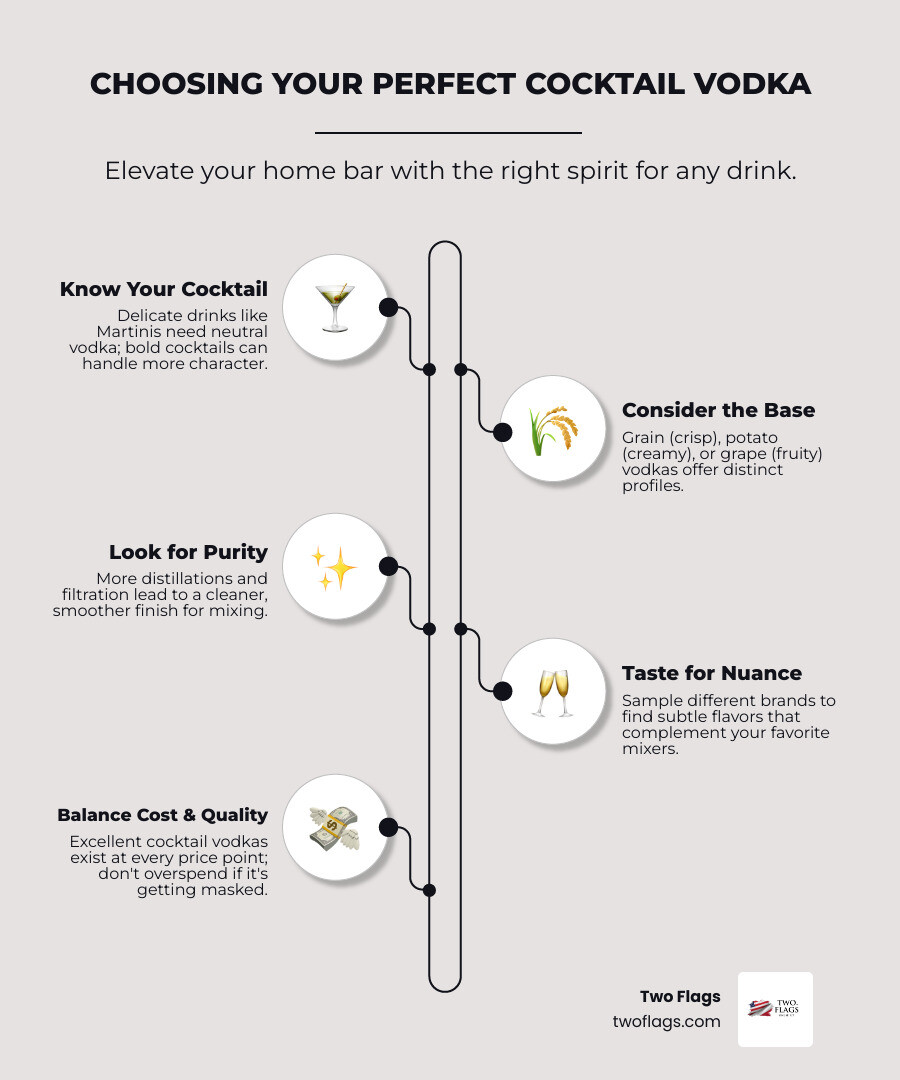
The Anatomy of a Great Cocktail Vodka
Think of vodka as the ultimate team player in your cocktail shaker. While many people assume all vodkas taste the same, the best vodka for cocktails actually walks a fine line between smoothness and subtle character. It's not about being completely flavorless – it's about having just enough personality to improve your drink without stealing the show.
What makes a vodka perfect for mixing? Smoothness is non-negotiable – nobody wants a harsh bite interrupting their carefully crafted cocktail. But here's where it gets interesting: the best mixing vodkas also bring subtle character to the glass. This character comes from the raw ingredients and how they're processed.
Neutrality doesn't mean boring. A great cocktail vodka provides a clean canvas that lets other ingredients shine while contributing its own smooth foundation. The mouthfeel – how the vodka feels in your mouth – should be pleasant and balanced, not too thin or oily.
Versatility is where premium vodka really proves its worth. Whether you're making a spirit-forward Martini or a fruit-forward Cosmopolitan, the right vodka adapts beautifully while enhancing every ingredient in your glass.
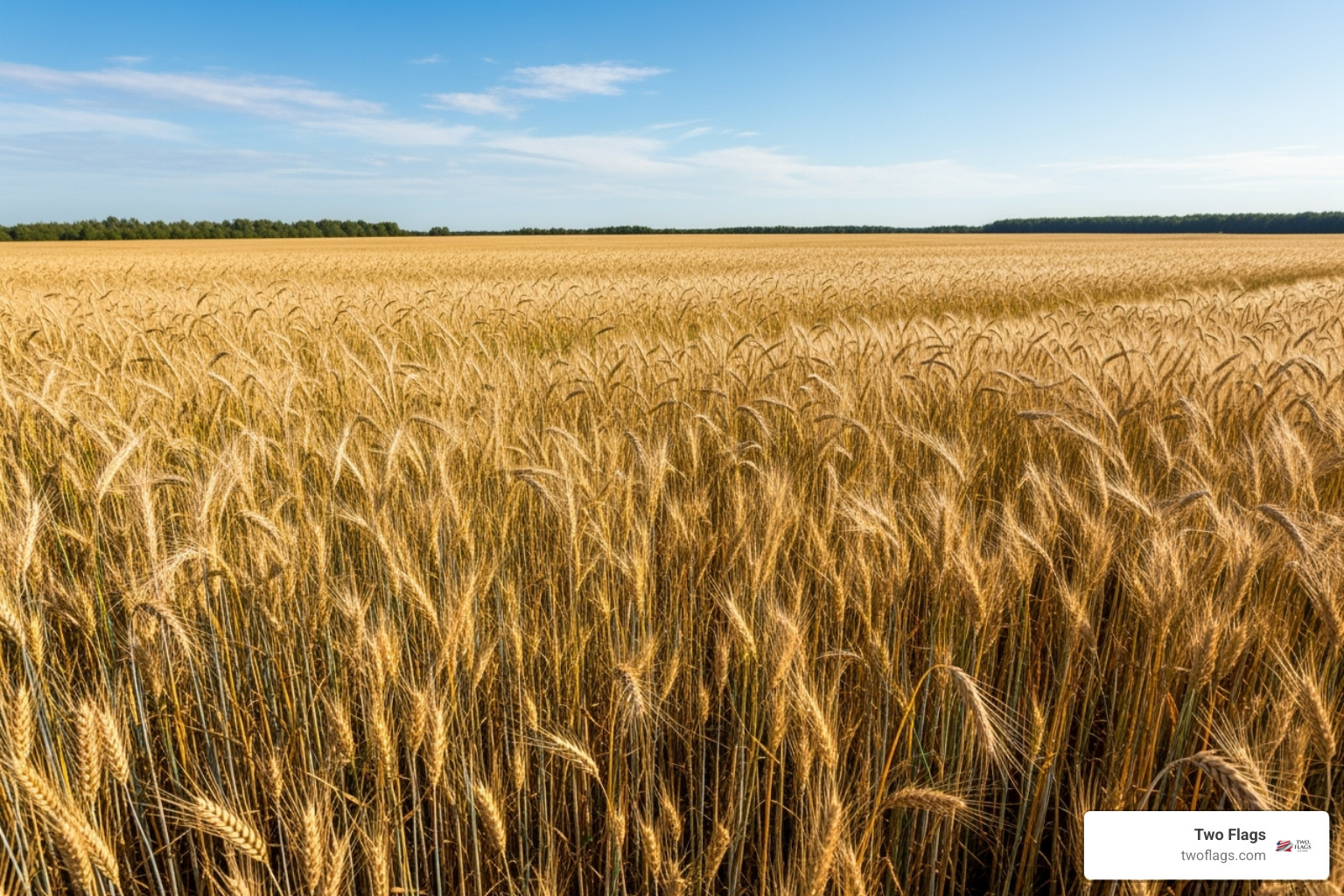
The magic happens during distillation and filtration – two processes that transform raw ingredients into the smooth spirit in your cocktail glass. Understanding these steps helps explain why some vodkas mix better than others.
For deeper insights into what separates good vodka from exceptional vodka, check out our guide on premium vodka brands.
Why Raw Ingredients Matter for Your Drink
Here's something that might surprise you: vodka can be made from potatoes, wheat, rye, corn, or even sugar beets. Each base ingredient brings its own personality to your cocktail glass.
Potato-based vodka offers something special – a naturally creamy texture that adds richness to cocktails. Two Flags Vodka, crafted from premium Polish potatoes, delivers this luxurious mouthfeel that lifts everything from Martinis to Moscow Mules. The earthy sweetness of potatoes creates a fuller body that many cocktail enthusiasts prefer.
Grain-based vodkas tell different stories depending on their source. Wheat-based spirits tend to be incredibly smooth with gentle, almost bread-like undertones. They're forgiving in cocktails and rarely overpower other ingredients.
Rye-based vodkas bring more personality to the party – expect a spicy kick with peppery notes that can add complexity to your drinks. This spiciness works beautifully in cocktails where you want a little extra character.
For those seeking gluten-free options, potato and corn-based vodkas are naturally safe choices. Two Flags Vodka being both potato-based and organic, provides a naturally gluten-free foundation for any cocktail. You can explore more gluten-free drinking options in our guide Beyond Beer: Finding Your Gluten-Free Drink Options.
The Science of Smooth: Distillation and Filtration Explained
Ever wonder how rough, fermented mash becomes crystal-clear vodka? It's all about the distillation process – essentially purifying alcohol through carefully controlled heating and cooling.
During distillation, the fermented base gets heated until alcohol vaporizes. These vapors are collected and condensed back into liquid form. This process removes impurities and unwanted compounds called congeners that can create harsh flavors and burning sensations.
You'll often see vodkas advertised as "distilled five times" or "triple distilled." While multiple distillations generally create smoother spirits, there's an important balance to strike. Too much distillation can strip away the subtle character that makes vodka interesting. The best vodkas find the sweet spot – pure and smooth, but still carrying hints of their original ingredients.
Filtration methods add the final polish. Charcoal filtration is common because activated charcoal grabs onto impurities like a magnet. Crystal filtration using quartz or other minerals can add unique smoothness and mouthfeel.
Here's the truth about the "more is always better" myth: excessive processing can actually hurt vodka quality. The goal isn't to create a completely tasteless spirit – it's to achieve perfect purity while preserving the delicate essence of premium ingredients.
The impact on purity is significant, but the real artistry lies in knowing when to stop. Two Flags Vodka demonstrates this balance perfectly – carefully distilled and filtered to achieve exceptional smoothness while honoring the natural character of our Polish potatoes.
How to Choose the Best Vodka for Cocktails of All Types
Picture this: you're making a Martini for a friend who claims they can taste the difference between premium vodkas. Then your neighbor stops by wanting a Moscow Mule. Your sister calls asking for the secret to your perfect Bloody Mary. Here's the thing - you can't use the same vodka strategy for all three drinks and expect stellar results.
The best vodka for cocktails changes depending on what you're mixing. It's like choosing the right tool for the job. A vodka that makes an exceptional Martini might disappear completely in a Bloody Mary, while a full-bodied vodka perfect for savory cocktails could overpower delicate citrus flavors.
Think of vodka as your cocktail's foundation. Sometimes it needs to be the star of the show, sometimes it's the perfect supporting player, and sometimes it's there to amplify every other ingredient without stealing the spotlight.
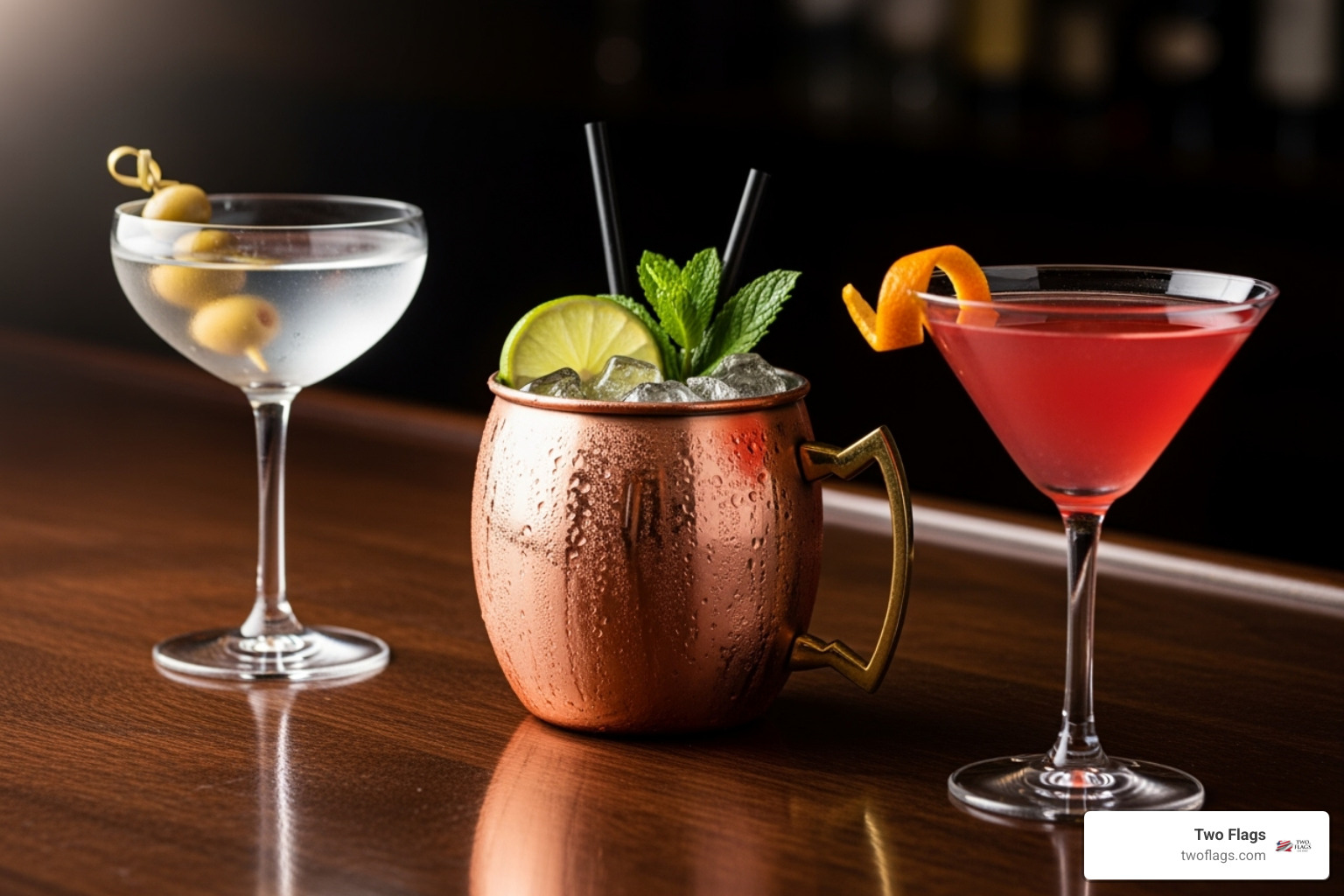
For Spirit-Forward Cocktails (Martinis, Vespers)
When you're making a Martini or Vesper, there's nowhere for mediocre vodka to hide. These drinks are essentially chilled vodka with a whisper of vermouth - which means vodka is absolutely the star. Every sip showcases exactly what's in that bottle.
This is where you want a vodka with real character. Not harsh or overpowering, but one with subtle personality that makes the drink interesting. Potato-based vodkas shine here because they bring that creamy, luxurious mouthfeel that makes each sip feel special. The slight earthiness adds depth without competing with the vermouth's botanicals.
Quality matters most in these cocktails because there's nothing to mask any flaws. A harsh vodka will make your Martini burn. A cheap vodka will taste, well, cheap. But a premium vodka with smooth character? That's how you create a Martini worth savoring.
Our Two Flags vodka was designed exactly for moments like these - when the vodka needs to carry the entire cocktail on its shoulders while still playing beautifully with classic garnishes like olives or lemon twists.
For Citrus & Refreshing Cocktails (Moscow Mules, Cosmopolitans)
Moscow Mules and Cosmopolitans are all about bright, refreshing flavors that make you want another sip. Here, your vodka needs to step back and let the ginger beer, lime, cranberry juice, and citrus take center stage. But "stepping back" doesn't mean being invisible - it means being the perfect supporting player.
You want a clean, smooth vodka that won't fight with those vibrant mixers. Any harshness will clash with the bright acidity of citrus. Any off-flavors will muddy those crisp, refreshing notes you're going for.
This is where a neutral vodka truly shines, but neutral doesn't mean flavorless. The best vodkas for these cocktails have a subtle sweetness or buttery quality that actually improves fruit flavors rather than competing with them. They provide the alcoholic backbone while letting every other ingredient sing.
The key is seamless integration. When you taste a perfect Moscow Mule, you shouldn't think "wow, this vodka is strong" - you should think "this is incredibly refreshing and perfectly balanced."
For Rich & Savory Cocktails (Bloody Marys)
Bloody Marys are flavor powerhouses packed with tomato juice, horseradish, Worcestershire sauce, hot sauce, and countless garnishes. This isn't a delicate cocktail - it's bold, complex, and unapologetically savory. Your vodka needs to match that energy.
Here's where full-bodied vodkas really prove their worth. A thin, overly neutral vodka gets completely lost in all those bold flavors. You need a vodka with presence - one that contributes to the drink's overall richness rather than just providing alcohol.
Potato-based vodkas excel in Bloody Marys because their creamy texture complements the thick, savory mix. That slight earthiness actually pairs beautifully with tomato and spice flavors. The vodka becomes part of the flavor profile instead of just hiding in the background.
Think of it this way: your Bloody Mary should taste like a cohesive, complex drink where every ingredient (including the vodka) contributes something meaningful. When you nail this balance, you get a Bloody Mary that's satisfying, rich, and completely delicious from first sip to last.
Beyond the Bottle: Tasting, Terroir, and Trends
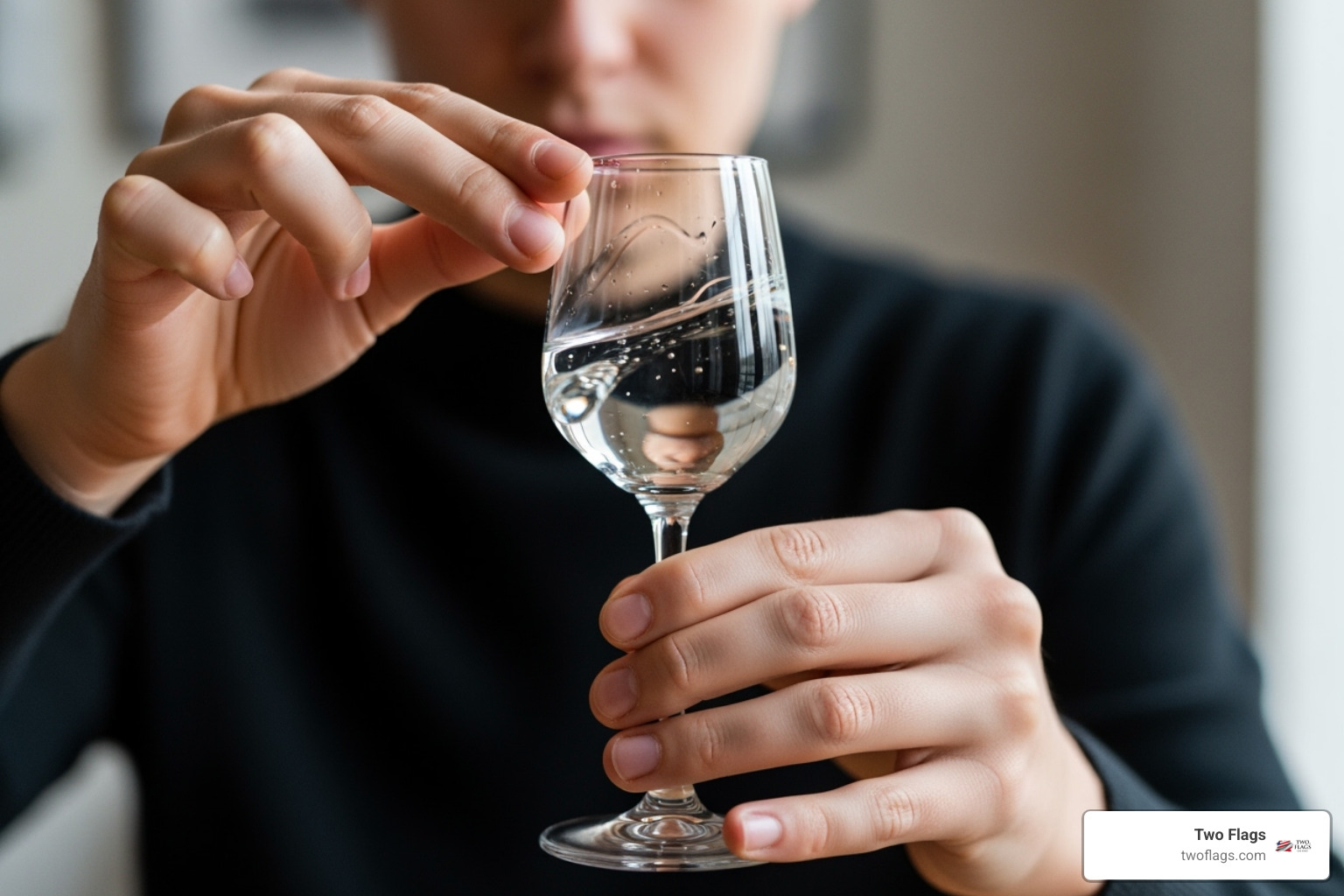
Finding the best vodka for cocktails becomes much easier once you learn to taste vodka properly. Most people think vodka all tastes the same, but that's like saying all wines taste identical. With a little practice, you'll find a whole world of subtle flavors and textures that can transform your cocktails.
How to Taste Vodka
Forget everything you know about vodka shots. For proper tasting, grab a small wine glass instead of a shot glass. The wider opening lets the aromas gather, giving you a much better sense of the spirit's character.
Start with the aroma. Swirl the vodka gently and take a gentle sniff. What do you notice? A well-made vodka might have hints of its base ingredient - perhaps the creamy earthiness of potatoes or the subtle sweetness of grain. You might detect notes of vanilla, citrus, or even a faint nuttiness. If you smell harsh alcohol fumes that make you wince, that's a red flag for a poorly made spirit.
Next comes the palate. Take a small sip and let it coat your tongue. Notice how it feels - is it thin and sharp, or does it have a pleasant, almost velvety texture? Pay attention to the initial taste. Some vodkas are peppery, others creamy, and some have a subtle sweetness. This mouthfeel is crucial for cocktails, as it affects how the vodka interacts with your other ingredients.
Finally, observe the finish. After swallowing, what lingers? A quality vodka should leave you with a clean, pleasant sensation rather than a burning throat. The best vodkas have what we call an "invisible finish" - you know you've had a drink, but there's no harsh aftertaste.
Here's a pro tip: try diluting your vodka with an equal amount of water. This reduces the alcohol burn and can reveal hidden flavors that the higher proof might mask. It's like opening a window to let fresh air into a room.
Vodka "Terroir" and Polish Regulations
You might think terroir only applies to wine, but vodka has its own sense of place too. The Vodka Belt stretching across Eastern Europe, particularly Poland, has been perfecting vodka production for centuries. The climate, water sources, and traditional methods all contribute to creating distinctive spirits.
Poland takes vodka seriously - perhaps more seriously than any other country. The strict laws around vodka production are incredibly specific. Polish vodka must be made from Polish ingredients - either grain or potatoes - and Polish water. More importantly, every step of production must happen on Polish soil. No shortcuts, no importing partially finished spirits.
This isn't just bureaucracy; it's a guarantee of authenticity. When you choose a Polish vodka like Two Flags, you're getting a spirit made according to centuries-old traditions and modern quality standards. These regulations ensure that what's in your glass represents the true character of Polish vodka craftsmanship.
Evolution of Vodka
Vodka's reputation has taken quite a journey over the past few decades. Traditionally, in Poland and other Eastern European countries, vodka was sipped neat alongside meals, much like wine. People appreciated the subtle differences between spirits made from different ingredients and regions.
Then something interesting happened around the 2010s. Marketing campaigns began emphasizing vodka's "purity" and "neutrality," often boasting about multiple distillations and exotic filtration methods. The message was clear: the best vodka was the most flavorless vodka. This led many craft cocktail enthusiasts to dismiss vodka as nothing more than liquid alcohol - a way to add proof without adding character.
Fortunately, we're seeing a welcome shift back to appreciating vodka's true nature. Bartenders and spirit lovers are refinding that quality vodka isn't flavorless at all. It has subtle, nuanced characteristics that can improve a cocktail rather than simply disappear into it. This evolution reflects a broader movement toward authenticity and quality ingredients.
At Two Flags, we're proud to be part of this renaissance. We believe vodka should have character - subtle, refined, but definitely present. That's why we're excited to support events like Two Flags, One Spirit: Taste of Polonia 2025 Official Sponsor, where we can share our passion for authentic, well-crafted vodka with fellow enthusiasts.
The best part about this trend? It means you have access to better vodkas than ever before, spirits that honor traditional methods while meeting modern standards for smoothness and purity.
Frequently Asked Questions about Mixing Vodka Cocktails
When we talk with home bartenders and cocktail enthusiasts, the same thoughtful questions keep coming up. These aren't just casual curiosities - they're the kind of questions that show people really care about crafting great drinks. Let's explore the most common ones we hear.
Does a more expensive vodka always mean a better cocktail?
Here's something that might surprise you: absolutely not! This is one of the biggest myths in the spirits world, and we've seen it trip up countless home bartenders.
Price often reflects marketing budgets and fancy packaging more than what's actually in the bottle. Some brands spend more on their celebrity endorsements than on their distillation process. Meanwhile, you might find an exceptional vodka at a reasonable price that completely transforms your cocktails.
The real secret is focusing on value over price tags. Look for vodkas that invest in quality ingredients and careful production methods. Certifications can be your friend here - an organic label tells you the producer cares about natural ingredients, while independent ratings provide honest assessments. Our Two Flags Vodka, for instance, earned an "Exceptional" rating from the Beverage Testing Institute, which means objective experts evaluated the liquid itself, not the marketing.
What matters most is finding a vodka that delivers smoothness and complements your cocktail. Sometimes that means spending a bit more, sometimes it means finding a hidden gem that won't break the bank.
Should I use flavored or unflavored vodka?
This question gets to the heart of cocktail philosophy, and the answer depends on what kind of drink experience you're after.
Unflavored vodka is your best friend for most cocktail situations. Think of it as the perfect supporting actor - it provides the alcoholic foundation while letting your other ingredients shine. When you're making a classic Martini or a refreshing Moscow Mule, you want the vermouth or ginger beer to be the star, not competing with artificial vanilla or berry flavors.
Flavored vodkas have their place, but they require a more thoughtful approach. If you decide to experiment with them, look for ones made with natural infusions rather than artificial additives. Real fruit essences and botanical extracts blend more harmoniously into drinks than synthetic flavors.
Here's a pro tip: making your own infusions at home gives you complete control. Drop some fresh berries into your vodka for a few days, or add herbs like basil or rosemary. You'll get exactly the flavor intensity you want without any artificial sweetness throwing off your cocktail's balance.
For most home bartenders, starting with a high-quality unflavored vodka provides the most flexibility and consistently great results.
What are the most common mistakes when choosing a cocktail vodka?
After years of helping people find the best vodka for cocktails, we've noticed three mistakes that can really hurt your drinks. The good news? They're all easy to avoid once you know what to watch for.
Using harsh vodka in simple cocktails is the biggest culprit. When vodka makes up most of your drink - like in a Martini or Vodka Soda - there's nowhere for a rough, burning spirit to hide. Every sip will remind you of that harsh bite. For these clean, spirit-forward drinks, investing in smooth, well-made vodka isn't just nice to have - it's essential for a pleasant drinking experience.
Ignoring the base ingredient is another missed opportunity. Remember how we talked about potato versus grain vodkas? That creamy texture from potato-based spirits can make your White Russian absolutely luxurious, while a crisp grain vodka keeps your Cosmopolitan bright and lively. Don't just grab any bottle - think about how the vodka's natural character will work with your other ingredients.
Not chilling vodka properly might seem minor, but it makes a huge difference in taste. Vodka's freezing point sits around minus 16°F, so your home freezer (usually around 0°F) won't freeze it solid. Keeping your vodka ice-cold in the freezer eliminates any harsh alcohol burn and creates that silky-smooth mouthfeel that makes cocktails truly enjoyable. For drinks served "up" without ice, this proper chilling becomes even more critical.
Pay attention to these details, and you'll notice an immediate improvement in every cocktail you make. The difference between a mediocre drink and an exceptional one often comes down to these seemingly small choices.
Conclusion: Lift Your Home Bar
Finding the best vodka for cocktails isn't about chasing the most expensive bottle or falling for flashy marketing claims. It's about understanding what makes vodka truly exceptional - and how the right choice transforms every drink you make.
Throughout our exploration, we've finded that great cocktail vodka starts with quality ingredients. Whether it's the creamy richness that comes from premium potatoes or the crisp character of carefully selected grains, these raw materials create the foundation for everything that follows. The magic happens through expert distillation and thoughtful filtration - processes that require skill and patience, not just repetition.
But here's what really matters: choosing based on your cocktail type makes all the difference. A spirit-forward Martini demands a vodka with character and smoothness that can stand alone. Bright, refreshing drinks like Moscow Mules need a clean backdrop that lets citrus and ginger shine. Rich, complex cocktails like Bloody Marys call for full-bodied vodka that adds texture and depth.
The right vodka becomes your foundation for great cocktails - not just an afterthought, but a carefully chosen ingredient that lifts every other element in your glass. It should be smooth enough to sip neat, yet versatile enough to blend seamlessly into any recipe you're crafting.
At Two Flags, we understand this philosophy deeply. Our Two Flags One Spirit Vodka embodies everything we've discussed - it's a premium Polish vodka crafted from organic potatoes, naturally gluten-free, and recognized as "Exceptional" by the Beverage Testing Institute. Most importantly, it delivers luxury quality without the luxury price tag.
When you stock your home bar with thoughtfully chosen spirits, every cocktail becomes an opportunity to create something special. Whether you're mixing classics or experimenting with new recipes, the right vodka makes the difference between a good drink and an unforgettable one.
Ready to find more about premium spirits? Find a guide to premium vodka brands and continue your journey toward cocktail mastery.


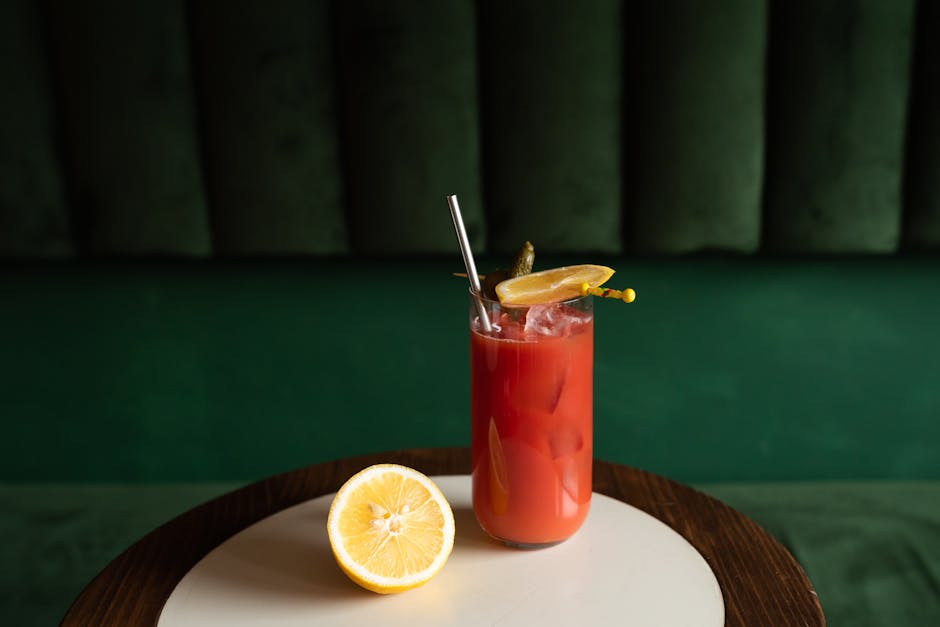


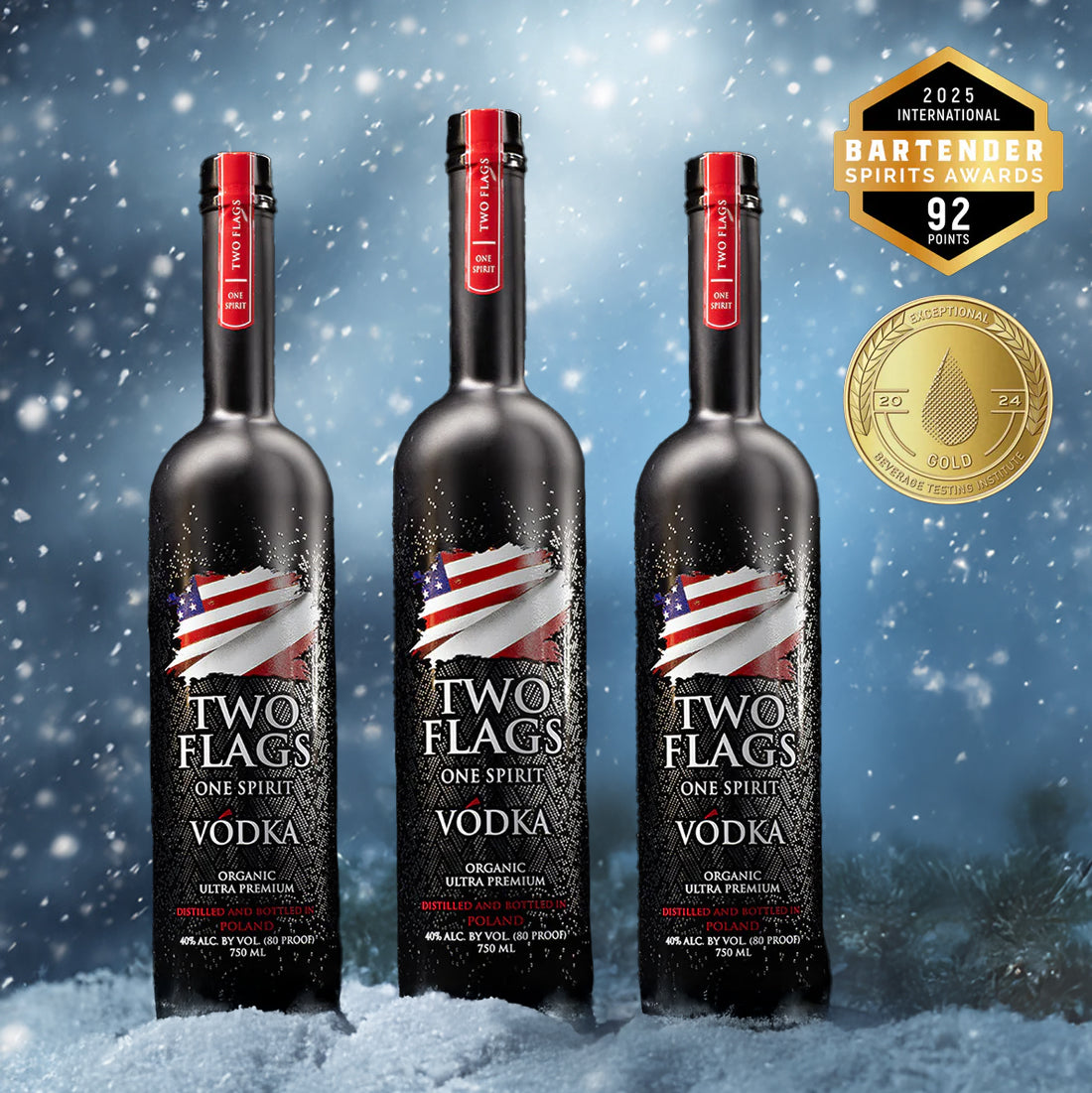
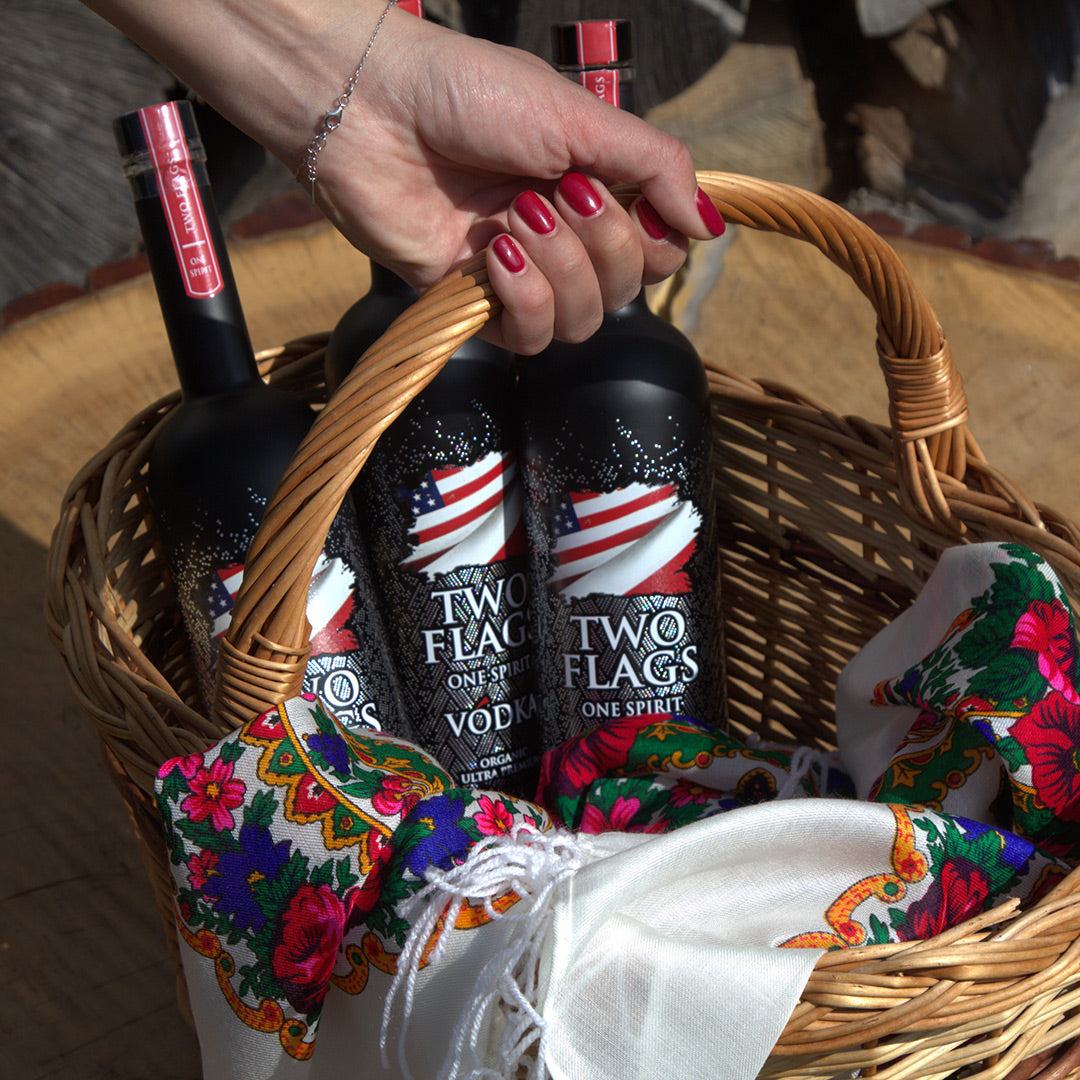
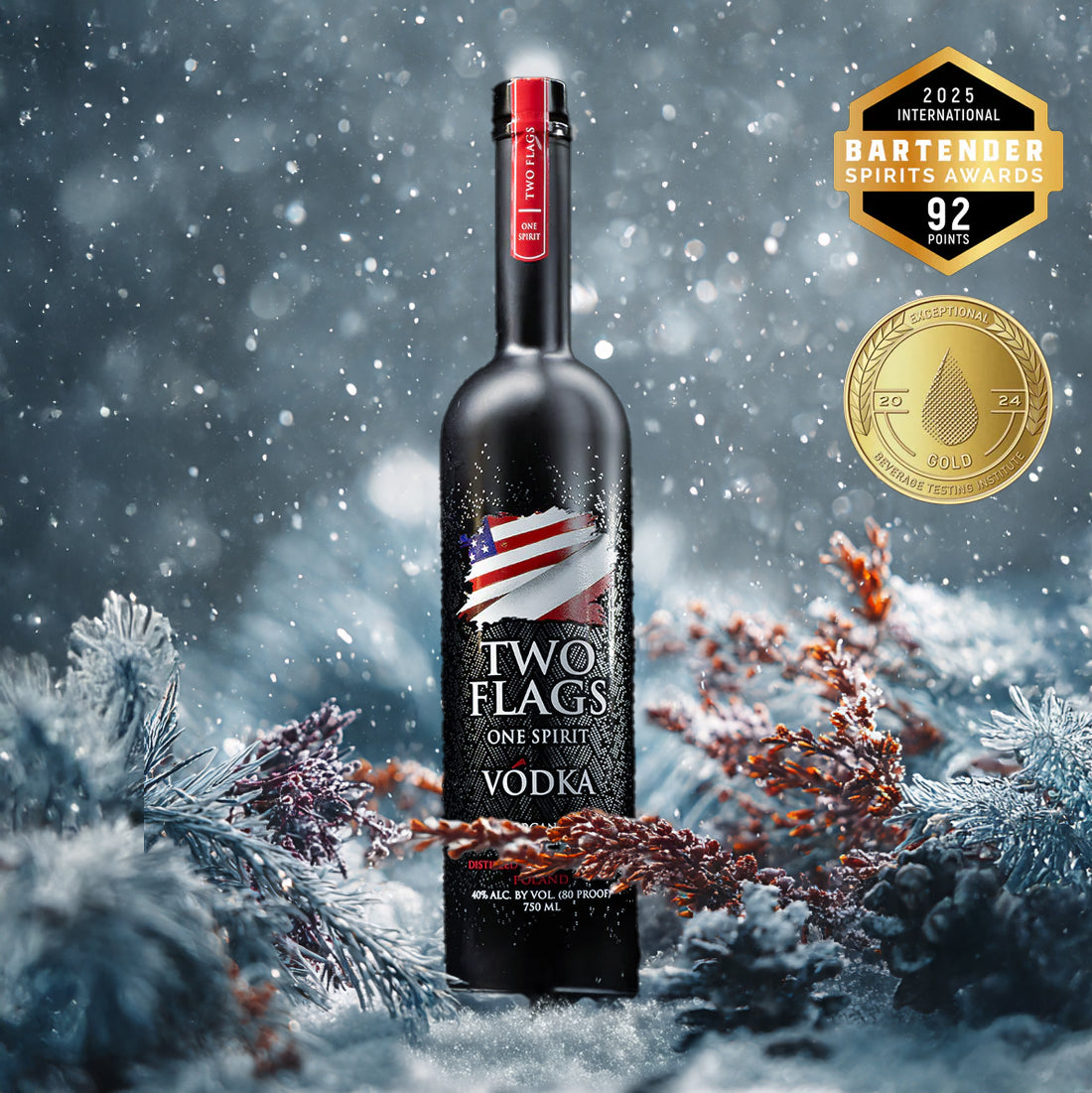
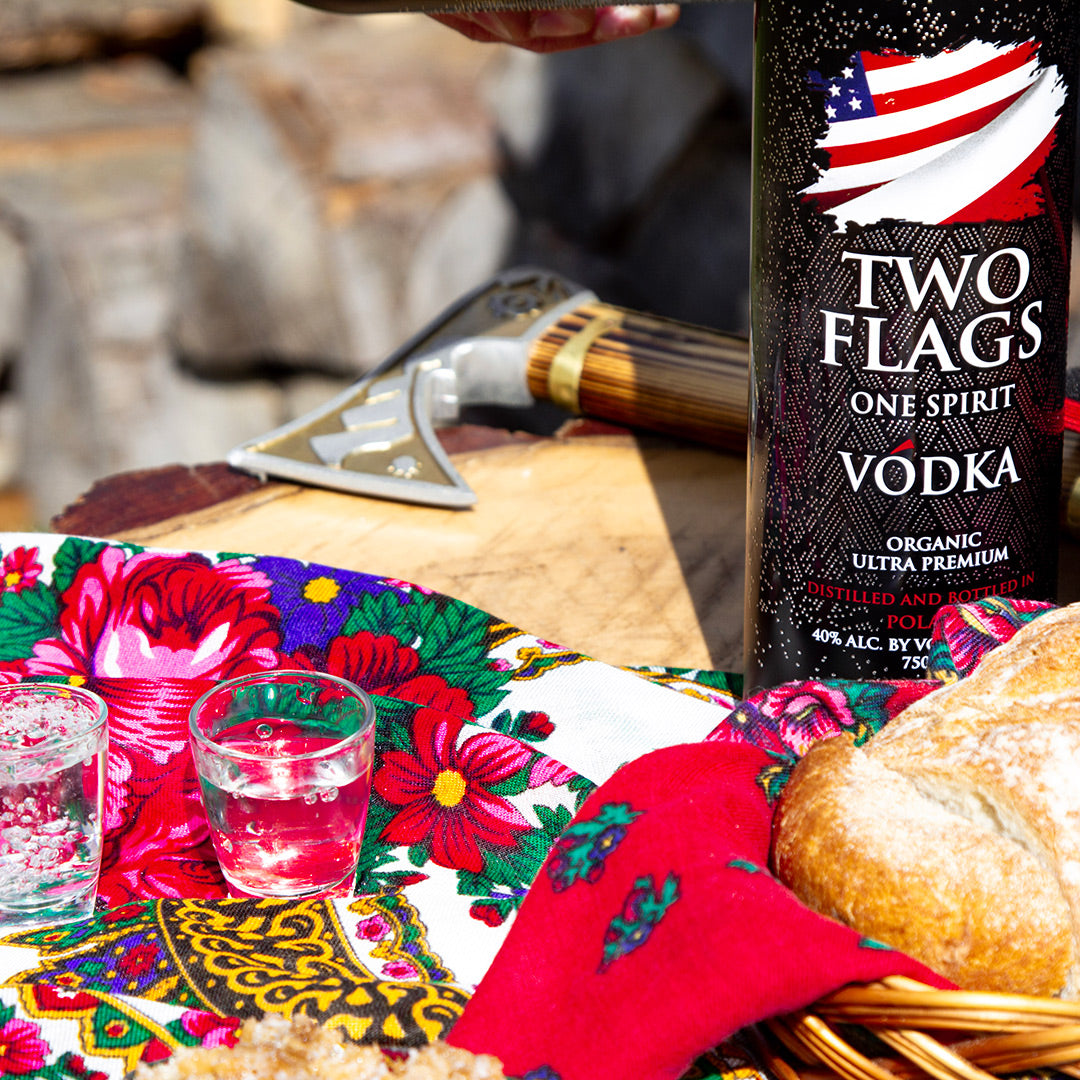
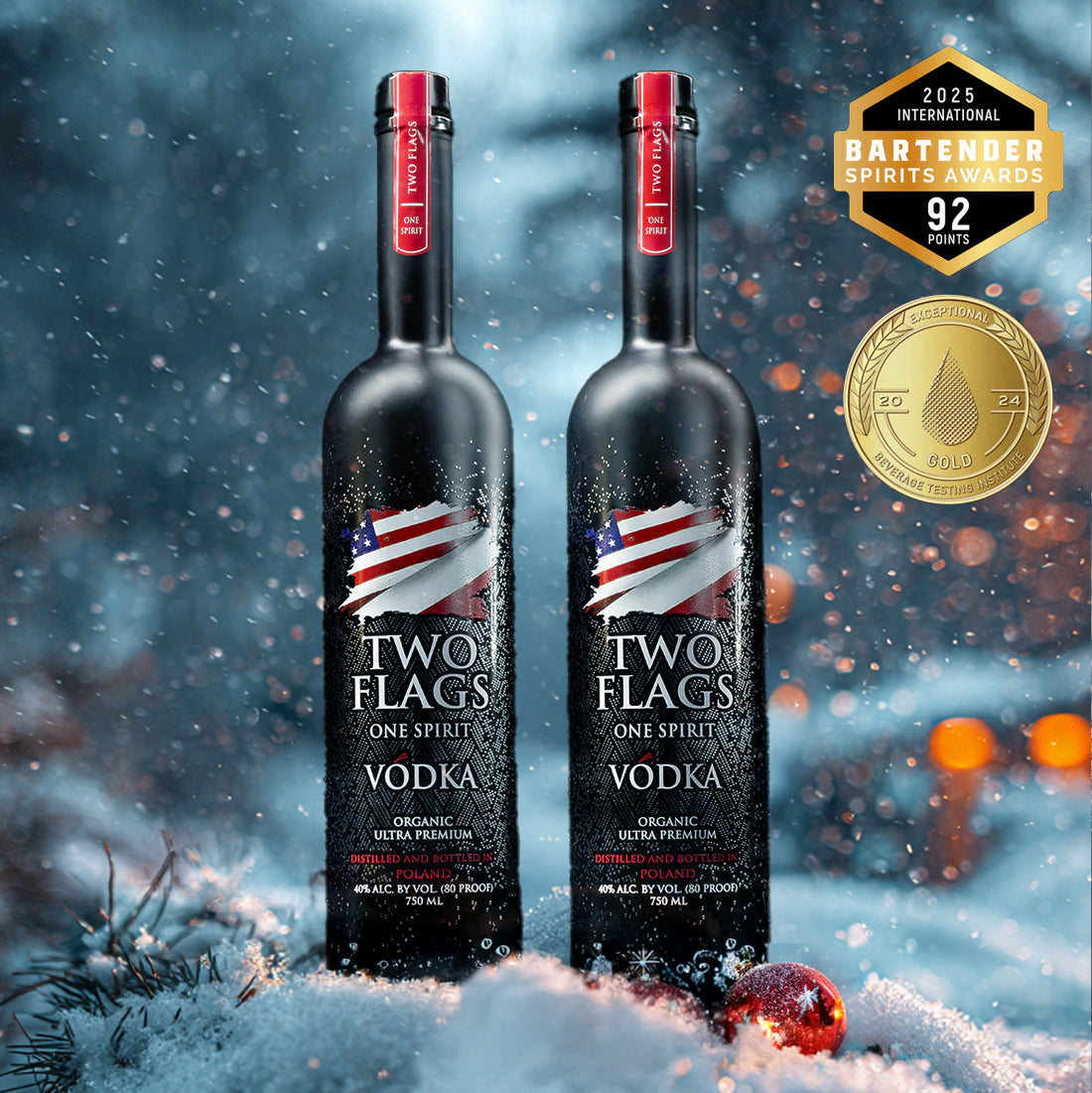
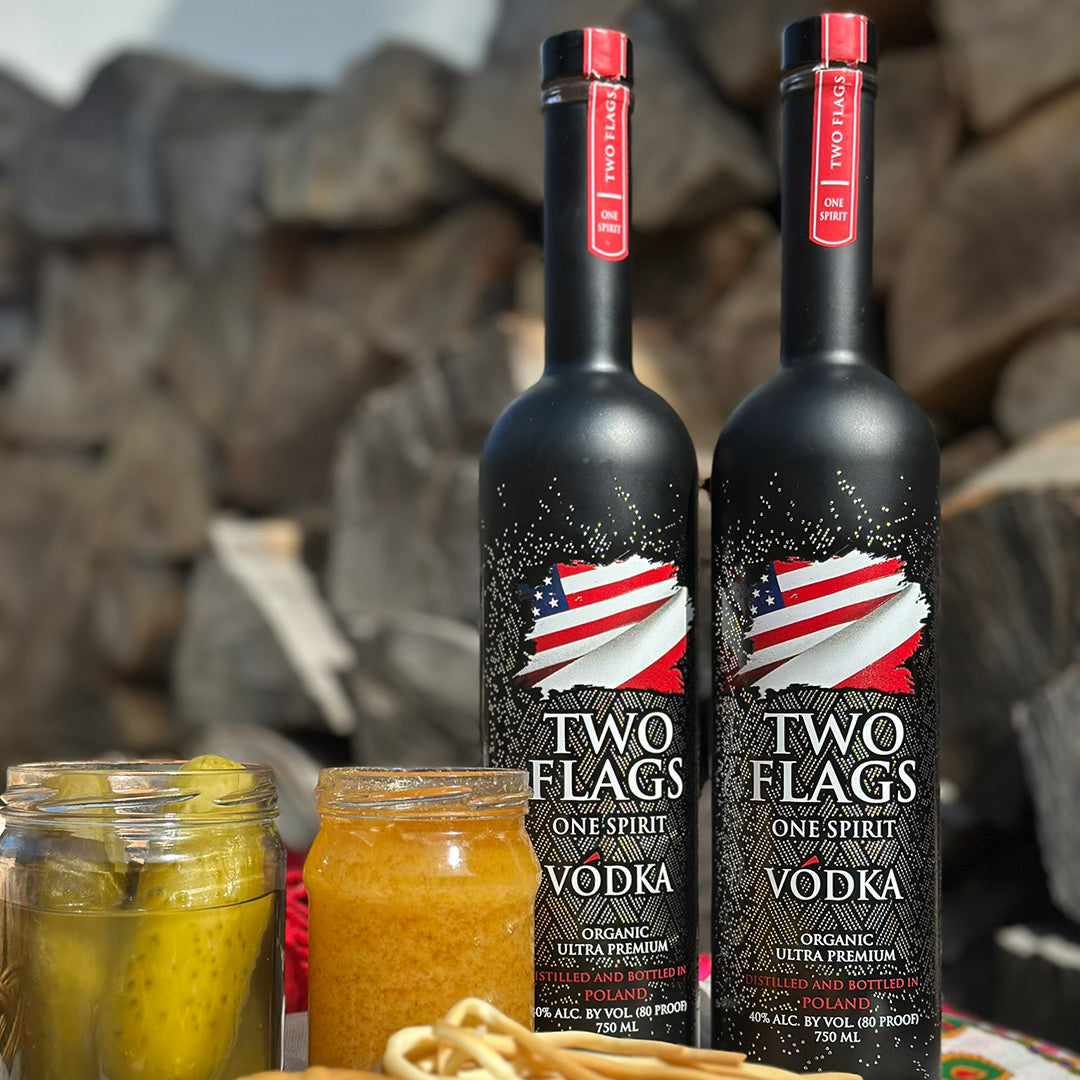
Zostaw komentarz
Ta strona jest chroniona przez hCaptcha i obowiązują na niej Polityka prywatności i Warunki korzystania z usługi serwisu hCaptcha.